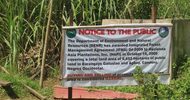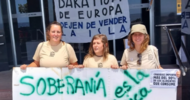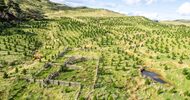The story may be over for the Menara Group in Aru, Indonesia. Now it’s time to look at Boven Digoel, where Menara is using the pretext of oil palm plantations to get its hands on 400,000 ha of primary forest.
Eva Bande, aktivis perempuan pejuang agraria ditangkap karena memimpin perjuangan petani melawan perusahaan sawit di Desa Piondo, Kecamatan Toili.
Indonesian court helps to tear aside the veil of secrecy under which huge corporations operate in UK-linked tax havens
Jefri Saragih talks about his organisation's long experience with the RSPO and the impacts of oil palm plantations in Indonesia.
Much of the palm oil we consume comes from Indonesia, where brutal methods are deployed against locals. One of the main suppliers says it is cleaning up its act, but has it really changed?
Elle accuse ces établissements de financer des sociétés impliquées dans des spoliations foncières, des exploitations forestières illégales et le travail des enfants.
Since 2007, a plantation company had been scheming to take over more than three-quarters of the Indigenous islanders’ ancestral land in the Aru islands of Indonesia.
- Interconintental Cry
-
21 April 2014
The clearing of forests inhabited by indigenous people in Indonesia's Papua Region by agribusinesses is fuelling conflict in the southern Merauke Regency.
Last week representatives of communities, indigenous peoples and NGOs met in Palangka Raya, Central Kalimantan, Indonesia to discuss deforestation and the rights of forest peoples.
Pujiono merupakan korban pengeroyokan aparat TNI dan sekuriti PT Asiatic. Dia sempat tak diketahui keberadaannya sejak sore hingga baru mendapat kabar keberadaanya beberapa menit menjelang ajal.
- Mongabay Indonesia
-
06 Mar 2014
A member of the Suku Anak Dalam indigenous community was killed and five others were injured during a clash with security forces on an oil palm concession owned by PT Asiatic Persada in Sumatra.
Indonesia's East Kalimantan provincial administration has set aside a 400,000 hectare plot of land for agricultural development for investors.
















